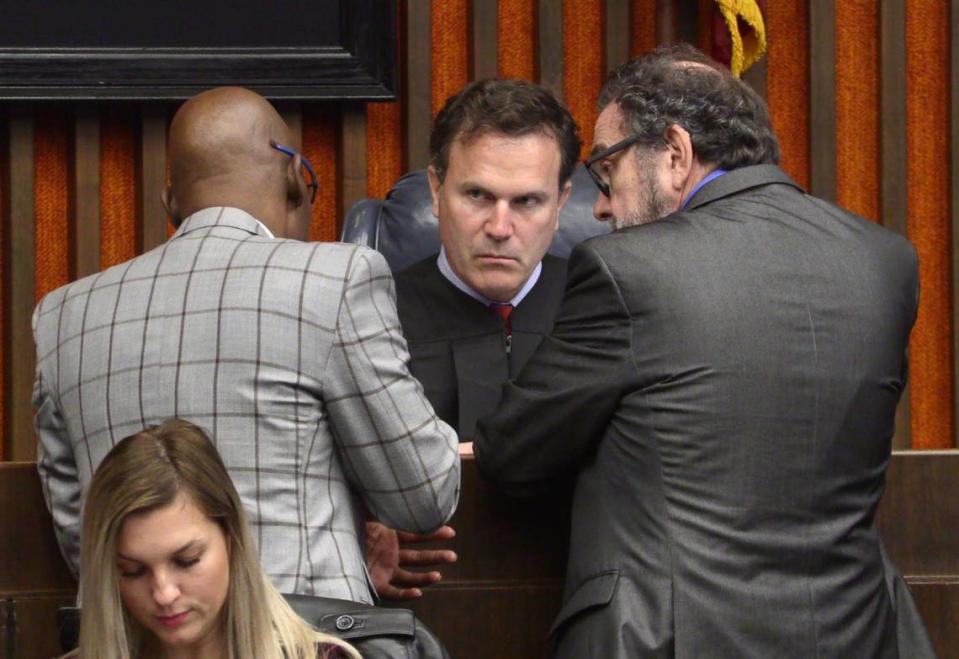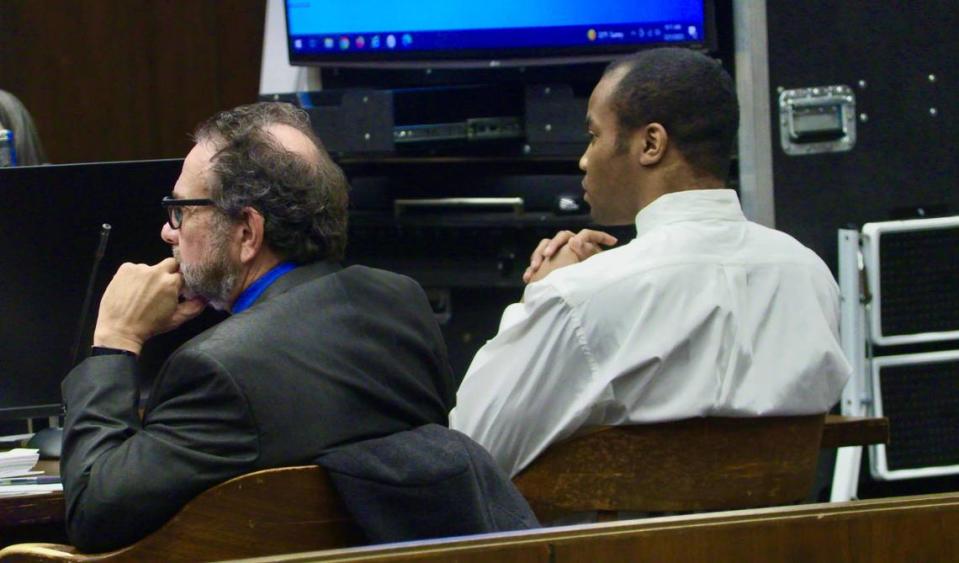‘Please stop!’ Witnesses recall alleged racially motivated stabbing at Columbus AutoZone
No one disputes that Jayvon Rayshawn Hatchett walked into a Columbus auto parts store and stabbed the first white man he saw, angered by videos of police violence against Blacks.
With murder charges still pending over an allegedly racist slaying in the Muscogee County Jail just days after his stabbing arrest, Hatchett went to trial Monday for the earlier assault on a store worker, also said to be racially motivated.
That was on August 25, 2020, about 8:30 a.m., when Hatchett, who is Black, walked into the the AutoZone, 950 32nd St., where worker Michael Hunt asked, “Is there anything I can do for you?”
Hatchett said his car was overheating, and they discussed what he might need, Hunt testified Monday.
“He wasn’t acting weird or anything like that,” Hunt said.
Hunt didn’t have the temperature gauge Hatchett said he needed, and directed him to other parts suppliers. Then Hunt turned away, and felt the knife in the back of his neck.
Hatchett stabbed him seven times, puncturing his right lung, as Hunt begged him to stop: “Please stop! I have a wife! I have kids!”
“What did you say?” Hatchett asked, and kept stabbing.
“This went on and on,” Hunt said.
Hearing Hunt’s pleas, co-workers rushed outside. Nathan Porter said he saw Hatchett stabbing Hunt and hollered, “Hey man, what the hell you doing?”
Derrick Carter Jr. said he saw Hatchett pull the knife out of Hunt and run out of the store.
As Hatchett fled, other workers came out, finding Hunt balled up on the floor, bleeding from wounds to his neck and back. They called 911, and tried to help their colleague, they testified Tuesday.
Witness Steve Strickland said they examined Hunt’s wounds, and saw “bubbling blood,” indicating his lungs were pierced. They applied pressure and kept Hunt conscious as they waited for an ambulance, he said.
Hunt was hospitalized for 12 days with a tube in his chest. The severity of his injuries left him in a wheelchair.

Insanity defense
The lead prosecutor in Hatchett’s assault case, District Attorney Stacey Jackson, said police reviewing surveillance video of Hatchett’s going to and from the store quickly identified him.
When two detectives arrested him the next day at a girlfriend’s home blocks away, Hatchett showed no remorse, Jackson said.

Asked why he committed the unprovoked assault, Hatchett told them, “I wanted to find a white man or white person to hurt.”
Hunt just happened to be that person, and Hatchett “just randomly picked him out as someone he wanted to hurt,” Jackson said.
Hatchett told police he’d been angered by watching videos related to the police shooting of a Black man, Jacob Blake, in Kenosha, Wis., which prompted protests at the time.
He directed them to the kitchen of his girlfriend’s home, where they retrieved the knife, its blade about six inches long, Jackson said.
The prosecutor said Hatchett may claim he was suffering from a “delusional compulsion,” and did not know right from wrong at the time, but prosecution witnesses will dispute that.
Hatchett’s defense attorney, public defender Steve Craft, said his client may have exaggerated his symptoms of mental illness, but that doesn’t mean he wasn’t ill.
The defense will not dispute that Hatchett stabbed Hunt, but it will argue he was suffering from delusions, after watching “raw, vicious and ongoing video” depicting police violence against Blacks, Craft said.
Hatchett had a psychosis that drove him to commit violence, and felt he had to act on that urge, Craft said: “That’s the crux of this case.”
Hatchett is being tried on charges of aggravated assault and using a knife to commit a crime.

The jail homicide
Hatchett, who was 19 at the time, also is accused of killing a white cellmate, Eddie Nelson Jr., the following Sept. 5, in the Muscogee County Jail. That case, yet to be resolved, spawned a federal lawsuit against the city government, now awaiting a decision from the 11th Circuit Court of Appeals.
Despite his reported motivation for the AutoZone stabbing, Hatchett was housed with a white cellmate, during his first nights in jail, with no issues.
On Aug. 27, 2020, he had a new cellmate, Eddie Nelson, 39, jailed for violating probation and failing to register as a sex offender.
According to evidence in the federal lawsuit, Hatchett told his cellmates that he was angered by a video about police shootings, and had stabbed the first white man he saw, yet this caused no tension.
No inmates or officers who were around Hatchett and Nelson from Aug. 27 to Sept. 4 reported any trouble between the two.
Then came the early hours of Sept. 5, when a corrections officer saw Hatchett kneeling on Nelson with his hands around Nelson’s neck. Nelson was covered in blood. He could not be resuscitated, and was pronounced dead around 2:30 a.m., authorities said. His cause of death was strangulation.
An investigator afterward wrote of Hatchett: “INMATE IS TO BE KEPT ALONE, ESPECIALLY FROM INDIVIDUALS OF WHITE RACE.”
In Nelson’s death, Hatchett besides murder is charged with two counts of aggravated assault, for beating Nelson and for strangling him.
The lawsuit
In November 2021, Nelson’s family filed an amended claim over the inmate’s death, narrowing their lawsuit to the staff who dealt directly with Hatchett.
Represented by attorney Craig Jones of Washington, Georgia, the plaintiffs are Jerry Nelson, Eddie Nelson’s brother and estate administrator, and Nelson’s widow Michele DuShane.
The defendants are a former corrections officer, Keyvon Sellers; a jail nurse, Kimberly Braxton; and her employer, jail healthcare vendor CorrectHealth Muscogee.
The suit claimed Braxton and Sellers were “deliberately indifferent” to the risk Hatchett posed to white inmates, in violation of the 14th Amendment. It claimed also that Braxton and CorrectHealth Muscogee were negligent under state law.

